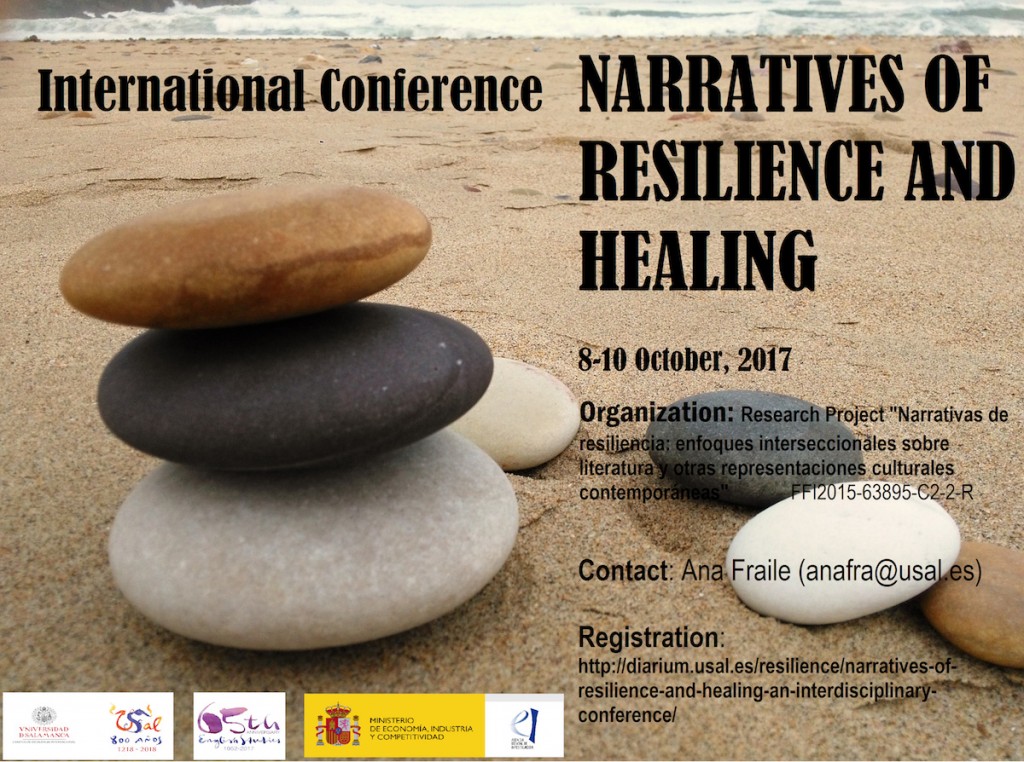Narratives of Resilience and Healing
An Interdisciplinary Conference
University of Salamanca
October 9-10, 2017
Chair
Ana María Fraile
University of Salamanca
Conference Registration
Descargar el programa completo / Download programme
Descargar resúmenes y notas biobibliográficas / Download abstracts and bios

In 2012 The Guardian declared the term resilience word of the year. Defined in Physics as the property of materials to accumulate energy under stress, deforming, but going back to normal once the pressure exerted on them has disappeared, the theoretical underpinnings of the concept go back to the 1973 writings of Canadian ecologist C. S. Holling on the resilience of ecological systems. Since then, resilience has assumed a central role in fields as diverse as business, law, urban design, technology, defense, health, psychology, education and environment issues. Unsurprisingly, in an era perceived as a continuing state of crisis and disaster, policy makers around the world adopt the concept of resilience to mobilize our capacity to make ongoing adjustments to changing political, economic, and ecological conditions, as well as to foster the foresight to prevent turbulences. Recently, the fields of history and anthropology have used the lens of resilience to engage the analysis of societies that collapsed for lack of anticipation, competence and ecological intelligence or control. In the Humanities, too, resilience is carving a niche for itself. Among other developments, Resilience: A Journal of the Environmental Humanities, published by the University of Nebraska Press, emerges in 2012 with the aim to provide a venue for environmental humanities scholars to engage with the natural and social sciences in the analysis and generation of narratives of sustainability. Likewise, Marianne Hirsch proposed the themes of vulnerability and resilience for the 2014 MLA convention as a means to put divergent fields in dialogue and “mobilize the textual, historical, theoretical, and activist work we do as teachers and scholars of languages and literatures to shape conversations about broad social and political problems.”
In addition, the concept of spiritual and bodily healing remains at the heart of all social justice projects, as it addresses the necessity of recuperation and renewal after individual or collective trauma resulting from armed conflict or from discriminatory and exclusionary practices and discourses either in our past or still ongoing present. Healing may be brought about through specific policies of reconciliation, like the Truth and Reconciliation Commissions established in South Africa after apartheid or more recently in Canada on the residential school system that damaged generations of Canadian Indigenous peoples. Social groups such as the Japanese Canadian (and Japanese American) Redress Movement have obtained reparations for the injustice committed against them during wartime; material reparations towards the descendants of enslaved Africans have been recently at the forefront of international debates. Likewise, different strategies for consciousness- and awareness-raising and for establishing solidarity and positive affects in the face of hardship and oppression have long been in the agenda of the feminist movements around the globe.
With the aim of creating synergies, facilitating a comparativist approach to the materials presented, reinforcing our international and interdisciplinary network, and disseminating the results of our work within and beyond the academic environment, this conference is jointly organized by the following research projects funded by the Spanish Ministry of Economy and Competitiveness:
- Coordinated projects “Narratives of Resilience: An Intersectional Approach to Literature and Other Contemporaneous Cultural Representation” (FFI2015-63895-C2-2-R University of Salamanca) and “Justice, Citizenship and Vulnerability: Precarious Narratives and Intersectional Approaches” (FFI2015-63895-C2-1-R University of La Laguna)
- Coordinated Projects “Bodies in Transit”: “From Conflict to Healing” (FFI2013-47789-C2-1-P University of Huelva) and “Making Difference in Globalized Cultures” (FFI2013-47789-C2-2-P University of Vigo)
- Project “TransCanadian Networks: Excellence and Transversality from Spain about Canada towards Europe” (FFI2015-71921-REDT University of La Laguna)




